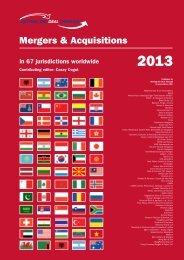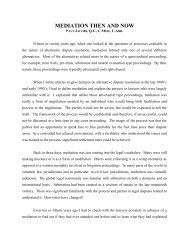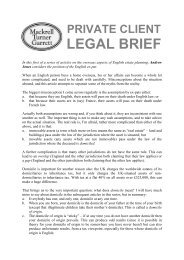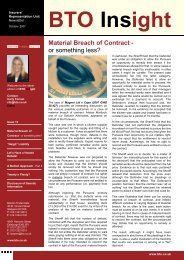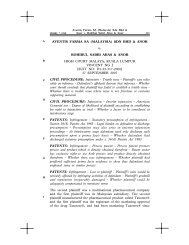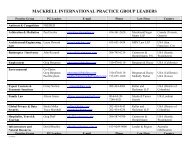International Arbitration 2007 - Mackrell International
International Arbitration 2007 - Mackrell International
International Arbitration 2007 - Mackrell International
You also want an ePaper? Increase the reach of your titles
YUMPU automatically turns print PDFs into web optimized ePapers that Google loves.
The <strong>International</strong> Comparative Legal Guide to:<br />
<strong>International</strong> <strong>Arbitration</strong> <strong>2007</strong><br />
A practical insight to cross-border <strong>International</strong> <strong>Arbitration</strong> work<br />
Published by Global Legal Group with contributions from:<br />
Advokaterne Amaliegade No 42<br />
Alban Tay Mahtani & de Silva<br />
Aluko & Oyebode<br />
Arsov Natchev Ganeva<br />
Attride-Stirling & Woloniecki<br />
Baier Boehm<br />
Basham, Ringe y Correa<br />
Benedetti & Benedetti Central Law<br />
BKBG Sociedade de Advogados<br />
Blake, Cassels & Graydon LLP<br />
Brick Court Chambers<br />
Bustamante & Bustamante<br />
Carey y Cía. Ltda.<br />
Clayton Utz<br />
Clifford Chance LLP<br />
CMS Cameron McKenna LLP<br />
Cuatrecasas Abogados<br />
Dechert LLP<br />
Díaz-Durán & Asociados Central Law<br />
Elvinger, Hoss & Prussen<br />
Estudio Alegria, Buey Fernández, Fissore &<br />
Montemerlo<br />
Foigt and Partners / Regija Borenius<br />
Freshfields Bruckhaus Deringer<br />
Ghellal & Mekerba<br />
Gilbert Walker<br />
Guevara & Gutierrez S.C. Servicios Legales<br />
Haavind Vislie<br />
Hill Dickinson LLP<br />
Homburger<br />
Johnson Stokes & Master<br />
Kachwaha & Partners<br />
Kojovic Law Office<br />
Kyriakides - Georgopoulos & Daniolos -<br />
Issaias Law Firm<br />
Lee & Ko<br />
Lejins, Torgans & Partners<br />
Lombardi Molinari e Associati<br />
Magister & Partners<br />
Matheson Ormsby Prentice<br />
Medina, Rosenthal & Fernández Central Law<br />
Mehmet Gün & Partners<br />
www.ICLG.co.uk<br />
Miranda & Amado Abogados<br />
Molina & Asociados Central Law<br />
Morais Leitão, Galvão Teles, Soares da Silva<br />
& Associados<br />
Nishimura & Partners<br />
O'Melveny & Myers LLP<br />
Pachiu & Associates<br />
Posse Herrera & Ruiz<br />
Quirós & Asociados Central Law<br />
Raidla & Partners<br />
Roschier, Attorneys Ltd.<br />
Rusconi, Valdez, Medina & Asociados Central<br />
Law<br />
S. Horowitz & Co.<br />
Shalakany Law Office<br />
SJ Berwin LLP<br />
Stibbe<br />
Vinge<br />
Werksmans<br />
WilmerHale<br />
Winston & Strawn LLP
Chapter 65<br />
Algeria<br />
Ghellal & Mekerba<br />
Amine Ghellal<br />
1 <strong>Arbitration</strong> Agreements<br />
1.1 What, if any, are the legal requirements of an arbitration<br />
agreement under the laws of your country?<br />
In order to respect the subject matter of this article, we will mostly<br />
develop on the Algerian rules applicable to international arbitration,<br />
as these rules differ from those applicable to domestic arbitration.<br />
However, we will address, in general terms, the major differences<br />
between the two sets of rules when necessary. If Algerian law is<br />
chosen for procedural purposes, domestic arbitration rules will<br />
apply to international arbitrations. In all cases, domestic courts will<br />
only intervene exceptionally in the arbitration proceedings.<br />
Article 458 bis of the Algerian Code of Civil Procedure (hereinafter<br />
“CCP”) defines international arbitration as one that cumulatively<br />
(a) involves a dispute relating to international trade, and (b) in<br />
which at least one party has its registered office or its residence<br />
abroad.<br />
An international arbitration agreement must be in writing in order<br />
to be valid. Article 458 bis 1 of the CCP provides that an arbitration<br />
agreement governs both existing and future disputes.<br />
Algeria recognises the principle of “autonomy of the arbitration<br />
clause”: article 458 bis 1 of the CCP clearly states that the validity<br />
of an arbitration agreement cannot be disputed solely because the<br />
contract it included is void.<br />
An arbitration clause will be considered valid if it conforms to the<br />
law governing the object of the dispute and specifically the law<br />
applicable to the governing contract. If such a law is not specified,<br />
the clause will be valid if it conforms to Algerian law.<br />
Also, public law entities (personnes morales de droit public) may<br />
choose arbitration as a dispute resolution method solely when<br />
involved in international transactions. We are only referring to<br />
public entities which are subject to public law in all aspects i.e., for<br />
their organisation and their activities (e.g. Ministries) as opposed to<br />
public entities which are subject to commercial law for their<br />
activities and to public law for their organisation (i.e. Public<br />
commercial companies called “établissements publics industriels et<br />
commerciaux”). The latter may have recourse to arbitration<br />
In all cases, the arbitration agreement should not be contrary to<br />
public order.<br />
1.2 Are there any special requirements or formalities required<br />
if an individual person is a party to a commercial<br />
transaction which includes an arbitration agreement?<br />
rights that he or she freely disposes of. Consequently, one cannot<br />
compromise on alimentary alimonies, inheritance rights, clothing,<br />
or on questions pertaining to public order and capacity.<br />
Therefore, as long as the individual person is a party to a transaction<br />
that is truly commercial in nature, id est, that does not refer to any<br />
of the issues stated above, the agreement will be deemed valid.<br />
In matters relating to international arbitration, this rarely is an issue<br />
due to the fact that the contracting entity will generally be acting<br />
within the scope of international trade.<br />
1.3 What other elements ought to be incorporated in an<br />
arbitration agreement?<br />
<strong>International</strong> arbitration agreements should, in practice, refer to the<br />
arbitral institution and to the law which will be governing<br />
procedure. It is also wise to indicate the chosen procedural<br />
language, the number of arbitrators and the venue. Generally, the<br />
parties will choose to include a model clause that makes reference<br />
to the rules of specific arbitral institutions (such as ICC).<br />
1.4 What has been the approach of the national courts to the<br />
enforcement of arbitration agreements?<br />
Although recent, Algeria’s international arbitration practice is<br />
extensive. The country ratified the New York Convention of 1958<br />
on the Recognition and Enforcement of Foreign Arbitral Awards.<br />
National courts have therefore been exposed to international<br />
arbitration procedures and awards, and generally grant exequatur<br />
insofar as the arbitration agreement is valid. The tribunal generally<br />
requires an original copy of the award, and a signed arbitration<br />
agreement. It also verifies whether the audi alteram partem<br />
principle has been respected.<br />
1.5 What has been the approach of the national courts to the<br />
enforcement of ADR agreements?<br />
Please refer to question 1.4. Algeria has less experience in other<br />
ADR methods such as mediation. However, the general approach<br />
of national courts to the enforcement of ADR agreements is positive<br />
as article 17 of the CPC allows the judge to seek conciliation in all<br />
domains. ADR agreements other than arbitration are generally<br />
considered to be transactions, defined by article 459 of the Algerian<br />
Civil Code as agreement intended to end or prevent a dispute by<br />
means of reciprocal concessions.<br />
478<br />
Article 442 of the CCP provides that any person can transact on<br />
WWW.ICLG.CO.UK<br />
ICLG TO: INTERNATIONAL ARBITRATION <strong>2007</strong><br />
© Published and reproduced with kind permission by Global Legal Group Ltd, London
Ghellal & Mekerba<br />
Algeria<br />
2 Governing Legislation<br />
2.1 What legislation governs the enforcement of arbitration<br />
agreements in your country?<br />
The Algerian Code of Civil Procedure governs the enforcement of<br />
arbitration agreements. Specifically, article 458 bis 17 to 458 bis 28<br />
of the CPC, to which we refer throughout the present contribution,<br />
sets out the rules applicable to the recognition, enforcement, and<br />
appeal of international arbitral awards.<br />
2.2 Does the same arbitration law govern both domestic and<br />
international arbitration proceedings? If not, how do the<br />
laws differ?<br />
<strong>Arbitration</strong> law differs according to whether the proceedings are<br />
domestic or international.<br />
The rules governing Algerian domestic arbitration are set forth in<br />
articles 442 to 458 of the CPC and the rules that are specific to<br />
international arbitration are set out in articles 458 bis to 458 bis 28.<br />
From a general standpoint, it can be said that the rules applicable to<br />
international arbitration are not as rigid as those applicable to<br />
domestic arbitration. For example, the rules applicable to domestic<br />
arbitration distinguish between a “compromise” in the case of<br />
existing disputes, and a “clause compromissoire” which is freely<br />
translated as an “arbitration clause” intended to solve future<br />
disputes. As we have seen in question 1.1, article 458 bis 1 does not<br />
make this distinction and only refers to an arbitration agreement<br />
applicable to both existing and future disputes.<br />
2.3 Is the law governing international arbitration based on the<br />
UNCITRAL Model Law? Are there significant differences<br />
between the governing law and the Model Law?<br />
The UNCITRAL Model Law was taken into consideration by the<br />
drafters of Legislative Decree n93-09 in the sense that they tried to<br />
avoid any contradiction with the generally accepted rules of<br />
international arbitrators. However, the drafters also sought<br />
inspiration in the most modern arbitration laws of different<br />
countries, including Swiss.<br />
A notable difference can be found in the Algerian definition of<br />
international arbitration (please refer to question 1.1).<br />
3 Jurisdiction<br />
3.1 Are there any subject matters that may not be referred to<br />
arbitration under the governing law of your country? What<br />
is the general approach used in determining whether or<br />
not a dispute is “arbitrable”?<br />
Please refer to question 1.2. Article 442 of the CCP provides that<br />
one cannot compromise on alimentary alimonies, inheritance rights,<br />
clothing, or on questions pertaining to public order, and to the state<br />
and capacity of persons.<br />
The most common obstacle to the arbitrability of a dispute is public<br />
order. The Public order is not clearly defined under Algerian law.<br />
Generally speaking, one can differentiate between the general<br />
concept of public order and the issues that pertain to public order<br />
(such as exchange control, tax regulation, and customs law). The<br />
general concept of public order refers to the rules that are intended<br />
to govern life in society and that aim to protect morality, economy<br />
or safety. Any agreement which violates public order is void.<br />
3.2 Is an arbitrator permitted to rule on the question of his or<br />
her own jurisdiction?<br />
Algerian law clearly recognises the principle of “competencecompetence”<br />
in international arbitration. Article 458 bis 7 states<br />
that the arbitral tribunal rules on its own competence. The same<br />
article provides that a party can challenge the competence of an<br />
arbitrator before defences are raised on the subject matter of the<br />
dispute: the arbitral tribunal rules on its competence by a<br />
preliminary decision, except if a challenge is mounted that relates<br />
to the subject matter of the dispute.<br />
3.3 What is the approach of the national courts in your<br />
country towards a party who commences court<br />
proceedings in apparent breach of an arbitration<br />
agreement?<br />
In practice, a national court will declare itself incompetent if it<br />
regards the arbitration agreement as valid. However, in a recent<br />
decision, a national court decided that arbitration may not obstruct<br />
a person’s natural right to have recourse to justice. These types of<br />
decisions are, however, exceptional and legally unfounded.<br />
3.4 Under what circumstances can a court address the issue<br />
of the jurisdiction and competence of the national arbitral<br />
tribunal?<br />
Please refer to question 3.3. As we have seen supra, in some cases,<br />
a party may seize the domestic court in order to see it decline the<br />
arbitrator’s competence. However, the court will start by studying<br />
the validity of the arbitration agreement. The court will declare<br />
itself incompetent if it considers the arbitration agreement valid.<br />
Please refer to section 1 for more information on the validity of an<br />
international arbitration agreement under Algerian law.<br />
In practice, the national courts have addressed the issue of the<br />
jurisdiction and competence of the national arbitral tribunal in the<br />
following cases: (a) one of the parties disputed the competence of the<br />
arbitration court; (b) one of the parts could not pay the provision; (c)<br />
one of the issues may not be subject to arbitration; (d) the clause is<br />
pathological; (e) the arbitrator is challenged; or (f) there is an objection<br />
based on professional or national secrecy or security.<br />
3.5 Under what, if any, circumstances does the national law of<br />
your country allow an arbitral tribunal to assume<br />
jurisdiction over individuals or entities which are not<br />
themselves party to an agreement to arbitrate?<br />
Under article 113 of the Algerian Civil code, a contract is only<br />
binding to the signing parties and cannot be imposed on a third<br />
party. This rule is applicable to arbitration agreements.<br />
Also, article 458 bis 21 of the CPC states that arbitral awards may<br />
not be opposed to third parties.<br />
The CPC, in its article 81, allows a party to involve an entity or<br />
individual in a suit if it considers that the latter should ultimately<br />
bear the burden of damages (insurers, or subcontractors for<br />
example). This is called a “call for guarantee” and may, in<br />
principle, be used also in the framework of arbitration.<br />
Algeria<br />
ICLG TO: INTERNATIONAL ARBITRATION <strong>2007</strong><br />
© Published and reproduced with kind permission by Global Legal Group Ltd, London<br />
WWW.ICLG.CO.UK 479
Ghellal & Mekerba<br />
Algeria<br />
4 Selection of Arbitral Tribunal<br />
5 Procedural Rules<br />
Algeria<br />
4.1 Are there any limits to the parties’ autonomy to select<br />
arbitrators?<br />
Algerian law does not fix direct limits to the party autonomy.<br />
However, indirect limits result from rules allowing parties to<br />
challenge the arbitrators.<br />
The nomination of an arbitrator may be challenged under certain<br />
circumstances. Under article 458 bis 5 of the CPC, a challenge is<br />
possible (a) if the arbitrator does not fulfil to the qualifications<br />
agreed upon between the parties; (b) when an additional cause of<br />
challenge is included in the arbitration regulation adopted by the<br />
parties; and (c) when an arbitrator has indirect or direct economic<br />
ties with one of the parties.<br />
Disputing parties may challenge the arbitrators they designated or<br />
contributed to designate only on the basis of reasons that emerged<br />
after the designation.<br />
4.2 If the parties’ chosen method for selecting arbitrators fails,<br />
is there a default procedure?<br />
5.1 Are there laws or rules governing the procedure of<br />
arbitration in your country? If so, do those laws or rules<br />
apply to all arbitral proceedings sited in your country?<br />
Some of the rules contained in the “<strong>International</strong> <strong>Arbitration</strong>” chapter<br />
of the CPC address, in general terms, procedural matters such as<br />
administration of evidence, and temporary or conservatory measures.<br />
However, in the main, the CPC refers to the choice of the parties for<br />
all procedural aspects. Article 458 bis 6 clearly states that the<br />
parties can, directly or by reference to an arbitration regulation,<br />
choose the procedure to be followed during arbitration. The<br />
arbitration may also be subject to a procedure elaborated by the<br />
parties in the agreement.<br />
If the agreement is silent on such issues and unless the parties have<br />
agreed otherwise, the arbitral tribunal chooses the procedure as needed,<br />
either directly or by reference to a law or arbitration regulation.<br />
Rules governing domestic arbitration address more procedural<br />
issues than those governing international arbitration (please refer to<br />
question 2.2).<br />
The CPC provides for a default procedure. However, one must<br />
distinguish upon whether the arbitration is to take place within or<br />
outside of Algeria.<br />
If the arbitration is to take place in Algeria, the diligent party may<br />
seize the competent court in order to have it designate the arbitrator.<br />
Under article 458 bis 3, the competent court is, alternatively: (a) the<br />
court designated by the arbitration agreement; (b) the court having<br />
jurisdiction over the area in which the arbitral tribunal has its seat;<br />
(c) the court having jurisdiction over the area where the defendant<br />
has his domicile; or (d) if the defender is situated outside of Algeria,<br />
where the plaintiff has his domicile.<br />
If the arbitration is to take place outside of Algeria and Algerian<br />
procedural law is chosen, the court of Algiers will have jurisdiction.<br />
4.3 Can a court intervene in the selection of arbitrators? If so,<br />
how?<br />
Yes, a court can intervene in the selection of arbitrators. Please<br />
refer to question 4.2. When a court is required to designate an<br />
arbitrator, it will do so by way of ordinance and upon party request.<br />
If the courts described under question 4.2 are to nominate a third<br />
arbitrator, the latter’s nationality must differ from those of the two<br />
first arbitrators.<br />
Furthermore, the court can designate the arbitrators from a list that<br />
has been drafted by the parties.<br />
4.4 What are the requirements (if any) as to arbitrator<br />
independence, neutrality and/or impartiality?<br />
5.2 In arbitration proceedings conducted in your country, are<br />
there any particular procedural steps that are required by<br />
law?<br />
Algerian Law does not provide for any particular steps in<br />
international arbitration proceedings. This is not the case with<br />
domestic arbitration (please refer to questions 2.2 and 5.1).<br />
5.3 Are there any rules that govern the conduct of an<br />
arbitration hearing?<br />
Algerian law does not govern the conduct of an arbitration hearing.<br />
This will be defined in the chosen procedure. However, as we will see<br />
in section 10, arbitration proceedings must abide to due process of law<br />
principles. This requirement indirectly affects the conduct of hearings.<br />
5.4 What powers and duties does the national law of your<br />
country impose upon arbitrators?<br />
The arbitral tribunal has authority to examine its own competence.<br />
Aside from this attribute, Algerian law is somewhat silent as to the<br />
powers and duties of the arbitrator.<br />
In most cases, the powers which an arbitral tribunal is granted under<br />
the CPC may be limited in the <strong>Arbitration</strong> Agreement. For example,<br />
article 458 bis 9 of the CPC provides that the arbitral tribunal may<br />
grant interim measures and temporary relief unless such a possibility<br />
is excluded in the arbitration agreement. Also, article 458 bis 12<br />
allows an arbitrator to grant partial awards, once again provided that<br />
the arbitration agreement does not state otherwise.<br />
480<br />
Please refer to question 4.1. Under article 458 bis 5 of the CPC, an<br />
arbitrator can be challenged when there is a doubt as to his<br />
impartiality. Article 458 bis 5 specifies that this is notably the case<br />
when the arbitrator has indirect or direct economic ties with one of<br />
the parties. It should be noted that article 458 bis 5 is not<br />
exhaustive, and in practice, a judge can deem an arbitrator as<br />
impartial in other circumstances.<br />
Also, in order to protect neutrality, a judge who is called upon to<br />
nominate an arbitrator will have to choose an arbitrator whose<br />
nationality is different from that of the party.<br />
WWW.ICLG.CO.UK<br />
© Published and reproduced with kind permission by Global Legal Group Ltd, London<br />
5.5 Do the national courts have jurisdiction to deal with<br />
procedural issues arising during an arbitration?<br />
The national courts do not have power to deal with procedural<br />
issues in international arbitrations. However, in some<br />
circumstances, the arbitrators may call upon the national courts in<br />
order to obtain assistance in procedural matters (such as admission<br />
of evidence).<br />
Rules applicable to domestic arbitration oblige the courts to<br />
ICLG TO: INTERNATIONAL ARBITRATION <strong>2007</strong>
Ghellal & Mekerba<br />
Algeria<br />
intervene if the procedure involved forgery or criminal conduct<br />
(article 448 al 2 of the CPC).<br />
5.6 Are there any special considerations for conducting<br />
multiparty arbitrations in your country (including in the<br />
appointment of arbitrators)? Under what circumstances, if<br />
any, can multiple arbitrations (either arising under the<br />
same agreement or different agreements) be consolidated<br />
in one proceeding? Under what circumstances, if any, can<br />
third parties intervene in or join an arbitration proceeding?<br />
Algerian law has not yet adapted its practice to multiparty<br />
arbitrations. The agreement of all parties would be necessary in<br />
order to consolidate proceedings. The joining of the third party will<br />
generally involve an amendment to the arbitration agreement or a<br />
new arbitration agreement signed by all parties.<br />
5.7 What is the approach of the national courts in your<br />
country towards ex parte procedures in the context of<br />
international arbitration?<br />
Please refer to question 5.1. On the basis of 458 bis 6, it is possible to<br />
organise an ex parte procedure when a party voluntarily does not present<br />
itself before the arbitral tribunal after having been regularly convened.<br />
The general rules applicable to Algerian judicial proceedings allow ex<br />
parte procedures (article 35 of the CPC). Therefore, if Algerian law is<br />
chosen as the applicable procedural law in the framework of an<br />
international arbitration, ex parte proceedings will be deemed valid.<br />
6 Preliminary Relief and Interim Measures<br />
6.1 Under the governing law, is an arbitrator permitted to<br />
award preliminary or interim relief? If so, what types of<br />
relief? Must an arbitrator seek the assistance of a court to<br />
do so?<br />
Under article 458 bis 9 of the CPC, an arbitrator may grant interim<br />
relief or conservatory measures. He is under no duty to seek the<br />
assistance of the court in such cases. However, he may seek the<br />
assistance of the court if the party does not voluntarily accept the<br />
injunction. The court will then apply its own law.<br />
Article 458 bis 6 of the CPC allow the parties to convene otherwise.<br />
6.2 Is a court entitled to grant preliminary or interim relief in<br />
proceedings subject to arbitration? In what<br />
circumstances? Can a party’s request to a court for relief<br />
have any effect on the jurisdiction of the arbitration<br />
tribunal?<br />
Rules applicable to international arbitration are silent on this point.<br />
However, once again, article 458 bis 6 of the CPC allows the parties<br />
to give such powers to the courts. If the parties are silent on this<br />
point, a court will not be allowed to grant such measures.<br />
recognised in the arbitral proceedings.<br />
6.4 Does the national law allow for the national court and/or<br />
arbitral tribunal to order security for costs?<br />
Algerian law does not explicitly grant such a power. Nor does it<br />
impede it.<br />
7 Evidentiary Matters<br />
7.1 What rules of evidence (if any) apply to arbitral<br />
proceedings in your country?<br />
The CPC does not develop on specific rules of evidence applicable<br />
to international arbitration procedures. However, under article 458<br />
bis 10. “the arbitral tribunal proceeds on its own to the<br />
administration of evidence.”<br />
Article 446 of the CPC, applicable to domestic arbitration, provides<br />
that the “timeframes and forms” applicable to jurisdictions will be<br />
applicable to arbitral tribunals. Therefore, if Algerian law is chosen to<br />
govern procedural issues, the evidence rules of the CPC will apply.<br />
7.2 Are there limits on the scope of an arbitrator’s authority to<br />
order the disclosure of documents and other disclosure of<br />
discovery (including third party disclosure)?<br />
Please refer to questions 7.1 and 7.3.<br />
Article 458 bis 11 of the CPC allows an arbitrator to seek the<br />
assistance of a tribunal for evidence purposes. Generally, one must<br />
refer to the normal procedural guarantees offered under the majority<br />
of the legal systems. Arbitrators must abide to the rule of<br />
professional secrecy.<br />
Also, article 458 bis 6 of the CPC allows parties to implement a<br />
specific discovery system.<br />
7.3 Under what circumstances, if any, is a court able to<br />
intervene in matters of disclosure/discovery?<br />
Article 458 bis 11 of the CPC provides that a court may be called<br />
upon in order to facilitate the administration of evidence. The<br />
arbitral tribunal, the parties in agreement with the arbitral tribunal,<br />
or the most diligent party once authorised by the arbitral tribunal<br />
may request the assistance of the jurisdictionally competent judge.<br />
7.4 What is the general practice for disclosure / discovery in<br />
international arbitration proceedings?<br />
The practice is to invite the party to submit the document. Failure<br />
to do so will give rise to a presumption against the defaulting party.<br />
If the document is absolutely necessary and a party does not provide<br />
it, intervention by the Courts may be requested.<br />
Algeria<br />
6.3 In practice, what is the approach of the national courts to<br />
requests for interim relief by parties to arbitration<br />
agreements?<br />
7.5 What, if any, laws, regulations or professional rules apply<br />
to the production of written and/or oral witness testimony?<br />
For example, must witnesses be sworn in before the<br />
tribunal? Is cross-examination allowed?<br />
Please refer to question 6.2. Since arbitrators are given the right to<br />
grant preliminary relief and interim measures, courts will declare<br />
themselves incompetent even when faced with a request for<br />
preliminary or interim relief. This will be the case unless the parties<br />
have agreed to grant courts specific powers which will be<br />
ICLG TO: INTERNATIONAL ARBITRATION <strong>2007</strong><br />
© Published and reproduced with kind permission by Global Legal Group Ltd, London<br />
There are no specific rules directly applicable to the production of<br />
written and/or oral testimony in the framework of international<br />
arbitration. These matters will be governed by the procedural law<br />
chosen by the parties.<br />
WWW.ICLG.CO.UK 481
Ghellal & Mekerba<br />
Algeria<br />
Algeria<br />
7.6 Under what circumstances does the law of your Country<br />
treat documents in an arbitral proceeding as being subject<br />
to privilege? In what circumstances is privilege deemed to<br />
have been waived?<br />
Algerian law does not address privilege. However, in practice, an<br />
arbitral proceeding is generally protected by confidentiality. This<br />
confidentiality applies to all documents submitted within the<br />
proceeding.<br />
8 Making an Award<br />
8.1 What, if any, are the legal requirements of an arbitral<br />
award?<br />
Artice 458 (bis) 13 of the CPC provides that the award is delivered<br />
in the procedure and in the form agreed upon by the parties. If the<br />
parties have not agreed on these modalities, an award will be<br />
rendered by a single arbitrator when applicable and by majority<br />
when there are numerous arbitrators. The award is written,<br />
explained, located, dated and signed by each arbitrator. If one of the<br />
arbitrator refuses to sign, the other arbitrators must mention it in the<br />
award; the award will then produce the same effect as if it had been<br />
signed by each one of them.<br />
A dissenting arbitrator may include his opinion in the award.<br />
9.3 Can parties agree to expand the scope of appeal of an<br />
arbitral award beyond the grounds available in relevant<br />
national laws?<br />
The parties are allowed to choose the procedural law that will<br />
govern the arbitral proceedings. If these laws or regulations<br />
comprise an additional appellate procedure, the procedural law will<br />
be enforced. It is therefore possible to expand the scope of appeal.<br />
9.4 What is the procedure for appealing an arbitral award in<br />
your country?<br />
Article 458 bis 24 of the CPC provides that the appeal of<br />
enforcement awards envisaged in articles 458 bis 22 and 458 bis 23<br />
(please refer to question 9.1) is carried out before the court with<br />
appellate jurisdiction over the tribunal that granted enforcement.<br />
The appeal must be formed within one month following the judge’s<br />
“notification” of the decision.<br />
10 Enforcement of an Award<br />
10.1 Has your country signed and/or ratified the New York<br />
Convention on the Recognition and Enforcement of Foreign<br />
Arbitral Awards? Has it entered any reservations? What is<br />
the relevant national legislation?<br />
482<br />
9 Appeal of an Award<br />
9.1 On what bases, if any, are parties entitled to appeal an<br />
arbitral award?<br />
The general rule is that an arbitral award may not be subject to<br />
appeal. However, under article 458 bis 25 of the CPC, an award<br />
delivered in Algeria in the scope of an international arbitral<br />
proceeding may be annulled for the reasons listed in article 458 bis<br />
23. Article 458 bis 23 deals with the appeal of enforcement<br />
decisions rendered by domestic courts. Such an appeal is possible<br />
in the following circumstances: (a) if the arbitral tribunal is<br />
considered not qualified or inefficient; (b) if the arbitration<br />
agreement is inexistent, void, or expired; (c) if the arbitral panel<br />
was improperly formed or if the sole arbitrator was irregularly<br />
designated; (d) if the arbitral tribunal rendered its award without<br />
conforming itself to its delimitated assignment; (e) if the arbitral<br />
tribunal decided ultra petita; (f) if the proceedings were not<br />
adversarial; (g) if the arbitral tribunal did not or insufficiently<br />
explained its award, or if its explanations are contradictory; or (h) if<br />
the recognition or the execution of the award is contrary to<br />
international public order.<br />
The CPC provides that the decision refusing the enforcement of an<br />
award may always be appealed.<br />
9.2 Can parties agree to exclude any basis of appeal or<br />
challenge against an arbitral award that would otherwise<br />
apply as a matter of law?<br />
Parties may agree to exclude the above described basis for appeal.<br />
However, in practice, some courts may consider that recourse to<br />
justice is a fundamental right that cannot be wavered. They<br />
therefore may accept the appeal even if the parties have agreed to<br />
exclude it.<br />
WWW.ICLG.CO.UK<br />
© Published and reproduced with kind permission by Global Legal Group Ltd, London<br />
Algeria adhered to the New York Convention on the Recognition<br />
and Enforcement of Foreign Arbitral Awards through Law n° 88-18<br />
of July 12th 1988. Algeria will apply the Convention only to<br />
recognition and enforcement of awards made in the territory of<br />
another contracting State, and only to differences arising out of<br />
legal relationships, whether contractual or not, that are considered<br />
commercial under Algerian law.<br />
One of the objectives behind the CPC’s 1993 modification (please<br />
refer to section 1) was to adapt Algerian regulation to its<br />
international obligations deriving from the convention. Articles<br />
458 bis and following of the CPC are therefore largely inspired by<br />
the Convention and sometimes even go further in the recognition of<br />
arbitral awards than the CPC itself.<br />
10.2 Has your country signed and/or ratified any regional<br />
Conventions concerning the recognition and enforcement<br />
of arbitral awards?<br />
Algeria approved the Washington Convention on the Settlement of<br />
Investment Disputes Between States and Nationals of Other States<br />
by Ordinance n° 95-04 of January 21st 1995. The convention was<br />
ratified by the Presidential Decree n° 95-345 of October 30th 1995.<br />
10.3 What is the approach of the national courts in your<br />
country towards the recognition and enforcement of<br />
arbitral awards in practice? What steps are parties<br />
required to take?<br />
Articles 458 bis 17 to 458 bis 21 set out the steps that parties are<br />
required to take for recognition and enforcement. The steps are the<br />
following:<br />
A party seeking recognition of an arbitral award must first<br />
establish the existence of the arbitral award. The said award<br />
must not be contrary to international public order.<br />
The award will be declared enforceable by the president of<br />
the court having jurisdiction over the territory where the<br />
award was rendered or where enforcement is sought.<br />
ICLG TO: INTERNATIONAL ARBITRATION <strong>2007</strong>
Ghellal & Mekerba<br />
Algeria<br />
The existence of an award is established by an original copy<br />
of the award and by the arbitration agreement, or by copies<br />
of these documents that sufficiently prove their existence.<br />
Notwithstanding the fact that Algerian courts, in general, apply the<br />
law, many of the country’s most important companies are parties to<br />
international contracts that include arbitration clauses. The credibility<br />
of these companies is therefore largely dependent on a correct<br />
application of international arbitration rules by Algerian courts.<br />
10.4 What is the effect of an arbitral award in terms of res<br />
judicata in your country? Does the fact that certain issues<br />
have been finally determined by an arbitral tribunal<br />
preclude those issues from being re-heard in a national<br />
court and, if so, in what circumstances?<br />
As soon as it is rendered, the arbitral award is res judicata in<br />
application of article 458 bis 16 of the CPC. An Algerian court may<br />
therefore not re-judge the dispute at issue.<br />
11 Confidentiality<br />
11.1 Are arbitral proceedings sited in your country confidential?<br />
What, if any, law governs confidentiality?.<br />
No rule specifically deals with the confidentiality of the arbitral<br />
proceedings. However, parties systematically include this principle<br />
in their agreement and courts enforce it.<br />
11.2 Can information disclosed in arbitral proceedings be<br />
referred to and/or relied on in subsequent proceedings?<br />
There is no impediment to the use of information disclosed in<br />
arbitral proceedings. On the one hand, if the subsequent<br />
proceedings are not confidential, and the court requires disclosure,<br />
parties will have to abide. On the other hand, if the parties<br />
voluntarily disclose such information, they will almost certainly be<br />
held ultimately liable on the basis of tort or contractual liability.<br />
Also, courts will generally bring the attention of the parties to the<br />
importance of confidentiality.<br />
11.3 In what circumstances, if any, are proceedings not<br />
protected by confidentiality?<br />
In some cases, public policy or acts of the prince may justify the<br />
violation of confidentiality. This may be the case for example, with<br />
tax inspections or criminal actions.<br />
12 Remedies / Interests / Costs<br />
The Algerian Civil Code also allows for liquidated damages.<br />
Article 183 states that “the parties may determine in advance the<br />
quantum of the compensation for liability. They can do so either in<br />
the contract itself or in another deed at a later stage…”.<br />
12.2 What, if any, interest is available?<br />
Algerian international arbitration law does not deal with interest<br />
rates. However, the law applicable to the merits of the case may<br />
limit the types of remedies offered. If the chosen substantive law is<br />
Algerian, article 186 of the Algerian Civil code will apply. The said<br />
article forces a debtor to repair the damage caused by the delay of<br />
his payment.<br />
12.3 Are parties entitled to recover fees and/or costs and, if so,<br />
on what basis? What is the general practice with regard<br />
to shifting fees and costs between the parties?<br />
Algerian international arbitration law does not address such issues,<br />
which are generally governed by the procedural law. There is no<br />
provision expressly allowing or impeding the shifting of fees and<br />
costs between parties. Under the Algerian CPC, the defeated party<br />
in a law suit must cover all related expenses. Courts systematically<br />
apply this principle.<br />
12.4 Is an award subject to tax? If so, in what circumstances<br />
and on what basis?<br />
The award itself is not subject to tax. However, the damages which<br />
may be allocated will be taxable if the entity is Algerian and subject<br />
to Algerian revenue tax.<br />
13 Investor State <strong>Arbitration</strong>s<br />
13.1 Has your country signed and ratified the Washington<br />
Convention on the Settlement of Investment Disputes<br />
Between States and Nationals of Other States (1965)?<br />
Algeria signed the Washington Convention on the Settlement of<br />
Investment Disputes Between States and Nationals of Other States<br />
on April 17th 1995. The convention was ratified on February 21st,<br />
1996 and entered into force on March 22nd, 1996.<br />
13.2 Is your county party to a significant number of Bilateral<br />
Investment Treaties (BITs) or Multilateral Investment<br />
treaties (such as the Energy Charter Treaty) that allow for<br />
recourse to arbitration under the auspices of the<br />
<strong>International</strong> Centre for the Settlement of Investment<br />
Disputes (‘ICSID’)?<br />
Algeria<br />
12.1 Are there limits on the types of remedies (including<br />
damages) that are available in arbitration (e.g., punitive<br />
damages)?<br />
Algerian international arbitration law does not limit damages.<br />
However, the law applicable to the merits of the case may limit the<br />
types of remedies offered.<br />
If Algerian law is chosen, the following rules will apply: Article 182,<br />
Paragraph 2 of the Civil Code, provides that losses are compensable,<br />
provided they are the “normal consequence of the non performance of<br />
the contract or of the delay in performing”. The Civil Code (articles<br />
184 al 2 and 185) also allow the judge to reduce damages in certain<br />
circumstances, notably if the claims are excessive.<br />
ICLG TO: INTERNATIONAL ARBITRATION <strong>2007</strong><br />
© Published and reproduced with kind permission by Global Legal Group Ltd, London<br />
Algeria has signed bilateral investment agreements with the<br />
following countries Austria, Belgium-Luxembourg, Bulgaria,<br />
China, Czech Republic, Denmark, Egypt, Ethiopia, France,<br />
Germany, Greece, Italy, Jordan, Korean Republic, Kuwait, Libya,<br />
Mali, Malaysia, Mozambique, Niger, Nigeria, Qatar, Romania,<br />
Saudi Arabia, Spain South Africa, Sudan, Sultanate of Oman, Syria,<br />
Turkey, USA, Vietnam, and Yemen. Most, if not all of these<br />
investment treaties, provide two options for parties involved in a<br />
dispute: they may either use ad hoc arbitration (Cnudci), or ICSID.<br />
Algeria is currently an observer to the energy charter.<br />
WWW.ICLG.CO.UK 483
Ghellal & Mekerba<br />
Algeria<br />
Algeria<br />
13.3 Does your country have standard terms or model language<br />
that it uses in its investment treaties and, if so, what is<br />
the intended significance of that language?<br />
Not all investment treaties follow the same model. However, most<br />
of them include the same general concepts and provisions that<br />
address issues such as national treatment and most favoured nation<br />
treatment, expropriation, transfer of funds, and dispute resolution.<br />
13.4 In practice, have disputes involving your country been<br />
resolved by means of ICSID arbitration and, if so, what<br />
has the approach of national courts in your country been<br />
to the enforcement of ICSID awards?<br />
The first ICSID based award involving Algeria was rendered on<br />
January 10th, 2005. The arbitral tribunal declined its own<br />
jurisdiction. A second decision based on the same dispute was<br />
rendered on the 12th of July 2006. The arbitral tribunal this time<br />
declared itself competent and sent back to a subsequent ordinance<br />
on the merits of the case. We therefore cannot yet evaluate the<br />
attitude of the Algerian courts in the face of such a decision.<br />
However, we have strong reasons to believe that it will continue<br />
enforcing awards as long as annulment may not be requested on the<br />
ground of article 458 bis 23 (please refer to question 9.1).<br />
13.5 What is the approach of the national courts in your<br />
country towards the defence of state immunity regarding<br />
jurisdiction and execution?<br />
14 General<br />
14.1 Are there noteworthy trends in the use of arbitration or<br />
arbitration institutions in your country? Are certain<br />
disputes commonly being referred to arbitration?<br />
Algeria’s experience in international arbitration is solid. The country<br />
has provided some of the world’s most reputable arbitrators. <strong>Arbitration</strong><br />
has been practiced in Algeria since its independence in 1962.<br />
From a financial point of view, Algeria is a healthy country. It has<br />
recently paid off all of its debts and is currently embarking on a<br />
spending spree intended, notably to modernise its infrastructures.<br />
An Association Agreement with the European Union was enforced<br />
as of September 1st 2005, and Algeria’s accession to the WTO<br />
should happen in the following years, if not soon.<br />
Given these facts, the Algerian state and the country’s economic<br />
operators are currently signing and will continue to sign<br />
international contracts which, in most cases will include arbitration<br />
clauses. Algerian international arbitration practice is therefore<br />
bound to augment.<br />
14.2 Are there any other noteworthy current issues affecting the<br />
use of arbitration in your country?<br />
Please refer to the questions above for a discussion of current<br />
issues.<br />
No immunity is granted to the state in the framework of its<br />
international agreements. This is true for both jurisdiction and<br />
enforcement purposes.<br />
484<br />
WWW.ICLG.CO.UK<br />
© Published and reproduced with kind permission by Global Legal Group Ltd, London<br />
ICLG TO: INTERNATIONAL ARBITRATION <strong>2007</strong>
Ghellal & Mekerba<br />
Algeria<br />
Amine Ghellal<br />
Ghellal & Mekerba<br />
7, rue Doudou Mokhtar<br />
lot no. 2, Ben Aknoun<br />
16000 Algiers<br />
Algeria<br />
Tel: +213 21 91 42 35<br />
Fax: +213 21 91 42 36<br />
Email: amine.ghellal@ghellal.com<br />
URL: www.ghellal.com<br />
Amine Ghellal, the founding partner of Ghellal & Mekerba, has 42<br />
years of experience as a legal practitioner. He has developed, in<br />
more than twenty years, a strong reputation in the field of<br />
international arbitration. He is an international arbitrator and a<br />
member of the <strong>International</strong> <strong>Arbitration</strong> Institute. He also has a<br />
perfect knowledge of contractual mechanisms and precautions<br />
governing dispute resolution. Dr. Ghellal currently acts as an<br />
arbitrator before the <strong>International</strong> Chamber of Commerce (CCI) and<br />
the Algerian Chamber of Trade and Industry (CACI).<br />
Dr. Ghellal is a graduate in both law and political science. He<br />
studied in France and obtained a Higher Diploma in Public law with<br />
Magna Cum Laude, a Higher Diploma in Political Science with<br />
Magna Cum Laude, and a PhD with Summa Cum Laude and praises<br />
of the examination board. He also taught public law, both in France<br />
and Algeria, for many years, and has published many articles. Dr.<br />
Ghellal is a member of the Algerian Bar Association, a member of<br />
the <strong>International</strong> Bar Association, a member of the <strong>International</strong><br />
<strong>Arbitration</strong> Institute (IAI), a correspondent of the World Bank in<br />
Algeria, an honoured Member of the <strong>International</strong> Who’s Who of<br />
Professionals, a member of the <strong>International</strong> Lawyers Club (Head<br />
Office in France), and a member of the <strong>International</strong> Lawyers<br />
Association “<strong>Mackrell</strong> <strong>International</strong>” (Head Office in Great Britain).<br />
Algeria<br />
Over the last two decades, Ghellal & Mekerba has been the trusted legal advisor of most prominent foreign and national<br />
corporations operating in Algeria. Ghellal & Mekerba’s constant efforts to achieve outstanding performance have allowed<br />
it to substantiate its status as Algeria’s leading law firm (Martindale Hubbell, Legal 500, Practical Law).<br />
Ghellal & Mekerba’s team is truly international and comprises Algerian, European and American trained members. Its<br />
sixteen dedicated attorneys, some of whom have more than thirty years of experience, provide the knowhow needed to<br />
guide their clients towards the complete success of a business venture. Several of the firm’s attorneys have significant<br />
corporate experience at high-level posts. This particular feature has allowed Ghellal & Mekerba to build an extensive<br />
professional network and has ensured its thorough understanding of the Algerian and North African business<br />
environment. All the firm’s lawyers are at least bilingual and work in French, Arabic, English, Spanish or German.<br />
The Firm is regularly ranked leading firm in Algeria by international institutions in the following specialities: corporate<br />
and commercial, mining and natural resources, financing/project financing and international arbitration.<br />
The Firm is in close relations with major law firms throughout the world and the representative in Algeria of “<strong>Mackrell</strong><br />
<strong>International</strong>,” a worldwide <strong>International</strong> Lawyers Association established in the United Kingdom.<br />
ICLG TO: INTERNATIONAL ARBITRATION <strong>2007</strong><br />
© Published and reproduced with kind permission by Global Legal Group Ltd, London<br />
WWW.ICLG.CO.UK 485






